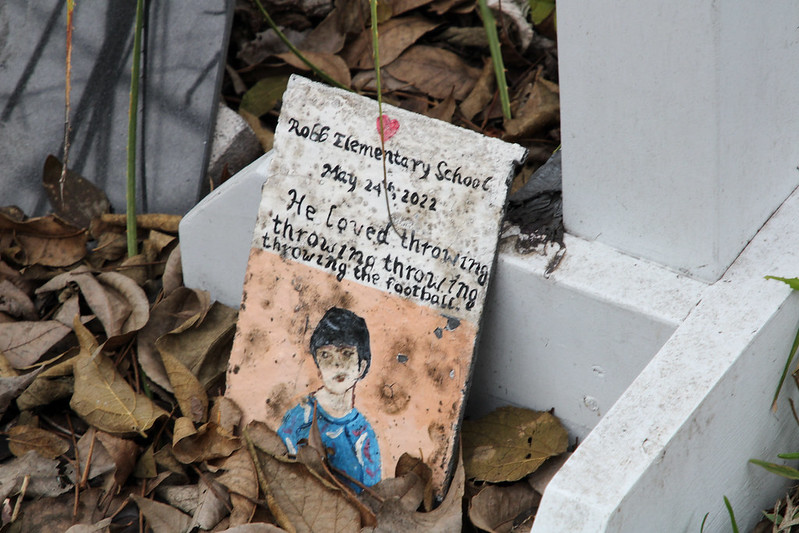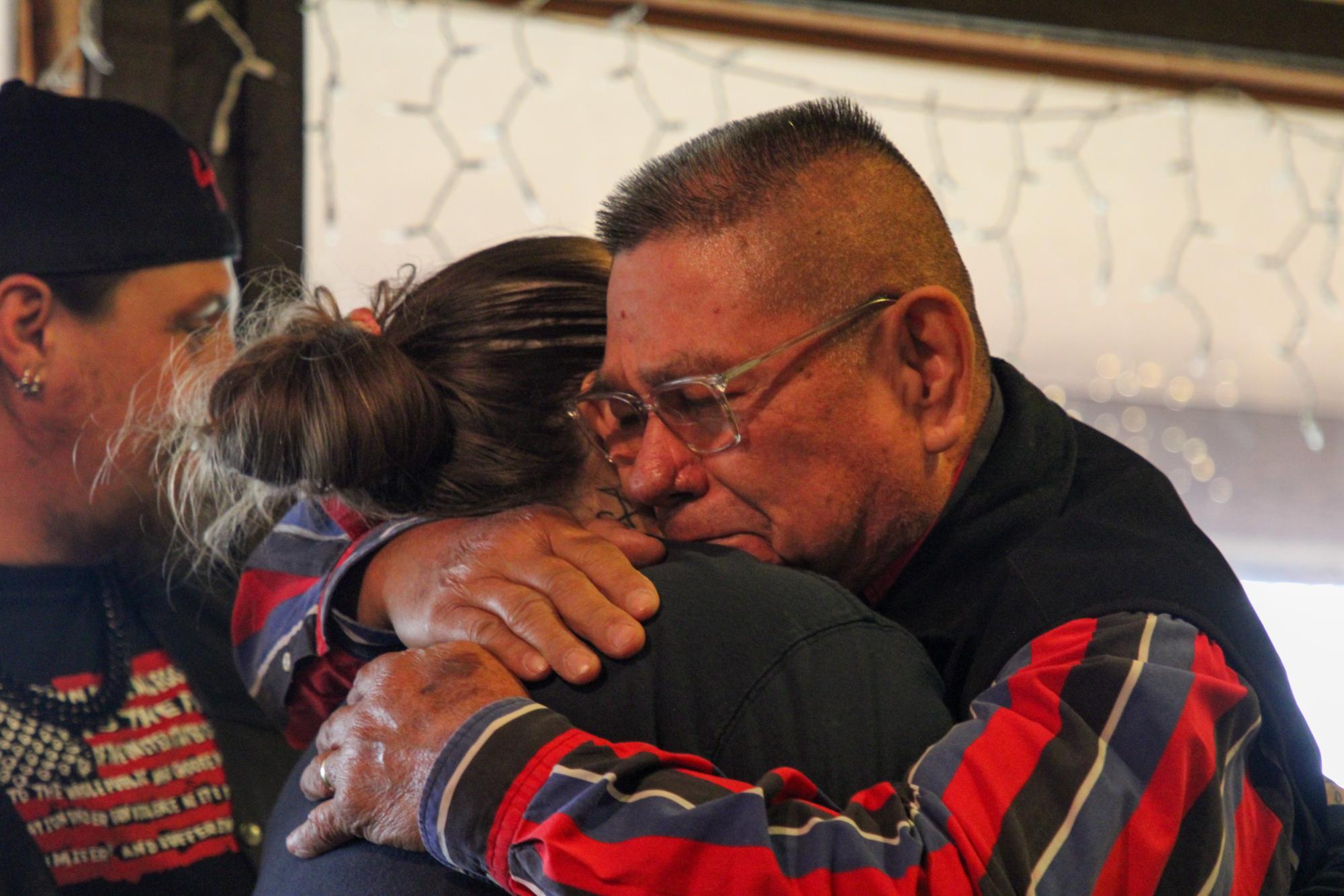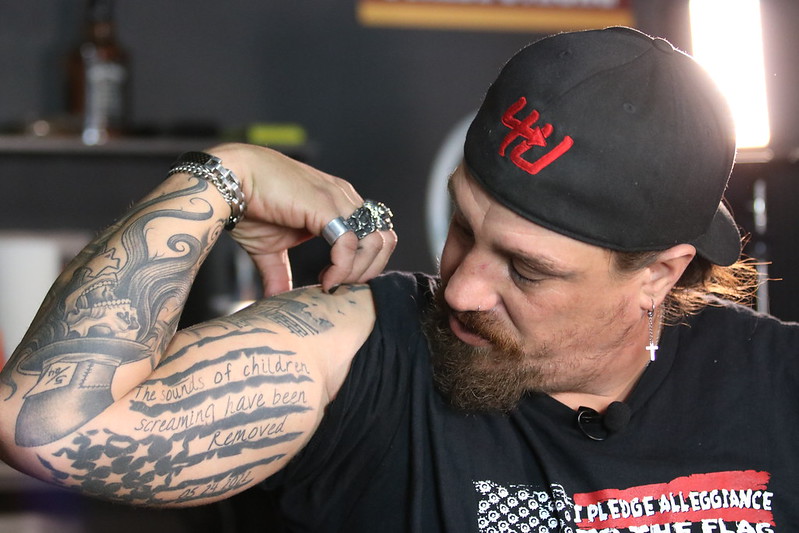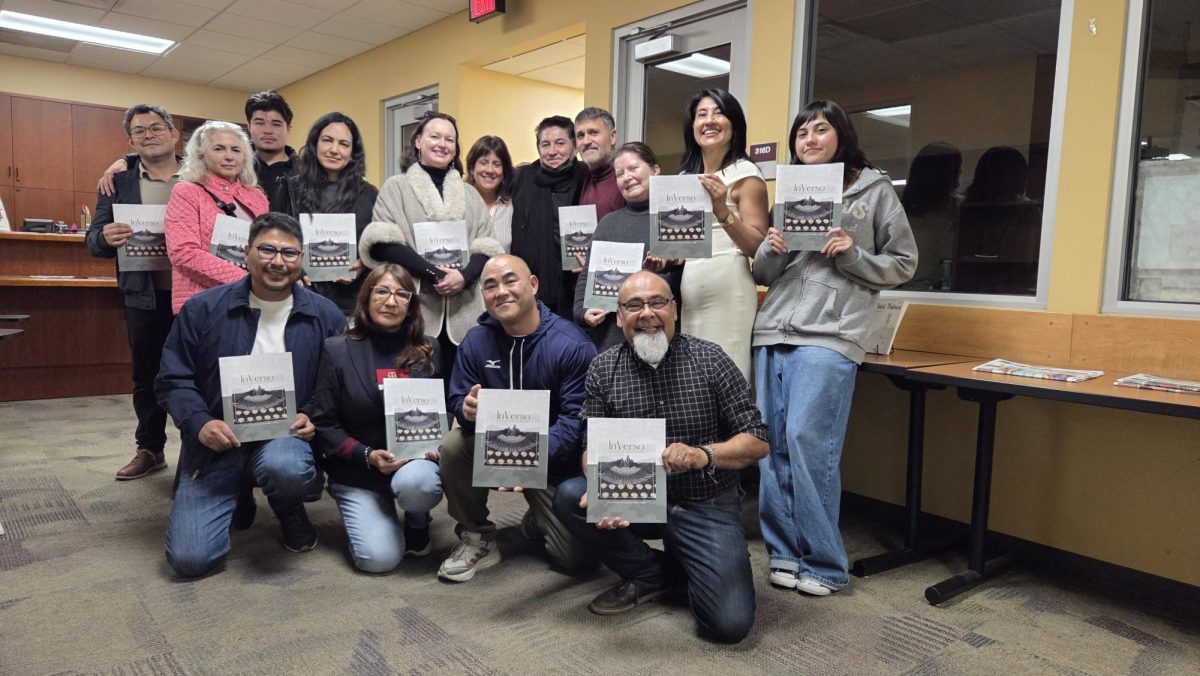Grief strikes at the most unexpected times. Never wished for, grief never goes away.
Twenty-one families and dozens more community members in Uvalde, Texas, were forever changed on May 24, 2022, when an 18-year-old went into Robb Elementary School with an AR-15 and killed 19 students and two teachers.
Nothing could’ve prepared the town of 15,000 for the worst: the pain that comes along with losing a loved one.
Their worlds turned upside down after the police took 77 minutes to enter the classrooms. All the comfort they’ve ever known and the familiarity of their hometown vanished in those long minutes.
How are the 21 families expected to carry on with their lives now that they have lost their child, parent, sibling, neighbor or friend? The pain that comes along with grief doesn’t disappear the second the funeral is over, or when school goes back after summer break.
After experiencing such a significant loss, simple daily tasks become incredibly overwhelming and seem nearly impossible. Tasks like cooking meals, doing work, getting dressed and even getting out of bed.
Losing someone whose presence is a pillar day-in and day-out brings up emotions and questions too complicated to understand. The unique thing about grief is that no two experiences are alike, even when two parents may be experiencing the loss of their child.
The immense shock of unexpectedly losing a loved one takes its toll. It is a physical and mental sensation that can be paralyzing. Time begins to move at a different pace and the world looks a little different, even if you’ve been in the same town your whole life, like many of the people of Uvalde.
Brett Cross lost his 10-year-old son, Uziyah “Uzi,” in the shooting. His hands are covered in rings and a chain hangs from his jeans as his glimmering eyes make their way around his home studio, which he has dedicated to his boy. The walls are covered with pictures, posters and graphics all honoring Uzi. Brett’s demeanor exudes nothing but a caring soul and a pain to see change.
He says, through sheer anger, “When there is a part of you that is gone for good, there’s no getting past that. You can learn different ways to make it through the day, but that hurt doesn’t ever ease up. You just learn how to cope better.”
Cross navigates his new normal by remembering Uzi, but also fighting to see change so no other parents experience the pain of losing their child to gun violence.
Grief has no shape. It is abstract. The five stages are a baseline of emotions, but they aren’t necessarily experienced in a linear process.
The tragedy that struck the town of Uvalde shook everyone to their core, but everyone is grieving differently, processing differently and moving forward differently.
The Response
Uvalde experienced a loss so profound and damaging, but the community and greater public weren’t always supportive.
After losing their Uzi, Brett and his wife, Nikki, went through what no family should have to experience while grieving.
The Crosses turned to advocacy and protesting. They participated in a sitout in front of the school administration office and after ten days, the district agreed to shut down their school police force.
The Crosses also slept outside of the Uvalde Police Department in mid March for four days to demand termination for the first responding officers who entered Robb Elementary and decided not to enter the classrooms to protect the kids.
Last summer, Brett traveled to the Senate Capitol for a six day sit in to demand a vote against assault weapons.
Their protests led to change.
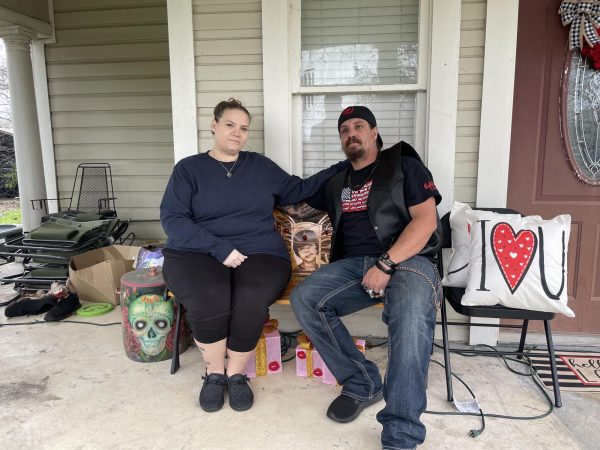
He started protesting downtown a few weeks after Uzi’s funeral in June 2022, and the first few days experienced backlash from people passing by him, including getting flipped off and being told to “go back to where you came from.”
He is active on social media and gives people a glimpse of what it’s like losing a child to gun violence. He is using his voice to get the message to a wider audience, but the comment section is filled with hate.
“I’ve gotten death threats,” he said. “I’ve had people threaten to kill my whole family and people that use Uzi’s name and picture and say, ‘I hated you,’ ‘I never loved you’ and that ‘he deserved to die.’”
Brett found himself facing reporters every day on his porch and at the town center. They knew where he lived and were looking to speak with him and Nikki.
A few days after the shooting, Brett made his way to the town plaza where 21 crosses were set up to honor those lost in the shooting. Standing in the plaza was a journalist who walked up to him and apologized for his loss, before proceeding to point a camera at his face.
With anger in his voice, Brett told the reporter to put the camera down, to which the reporter replied, “Hey, man, don’t be mad at me. I didn’t pull the trigger.”
Their privacy was stripped away — something they shouldn’t have to worry about after losing their son, who was their light and motivation. They had some initial support after the shooting, but that support quickly fizzled and it became incredibly difficult to find peace in their own home.
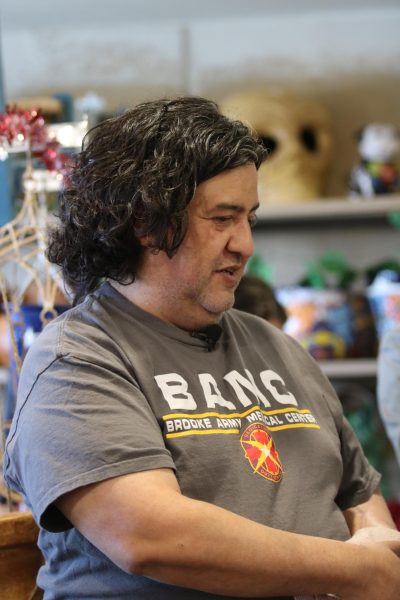
Arnie Reyes, the only survivor from classroom 111, lost his eleven students that horrific day in May. Reyes sustained serious injuries from gunshot wounds on his left arm and back, leaving his arm paralyzed. Reyes underwent numerous surgeries and still struggles to get his physical therapy and treatment covered financially.
“I didn’t feel support from [the Uvalde Independent School District]. They never called to check up on me,” he says. “So as far as support, I mean, I’ve pretty much been on my own and I feel that way. I don’t think my life matters to them.”
After losing a loved one and experiencing trauma to this degree, others’ actions become significantly more noticeable. Reyes, the families and other teachers who will forever feel immense pain and heartache, were thrown into paralyzing fear and uncertainty.
Nicole Ogburn, a 4th grade teacher of 10 years at Robb Elementary School and Uvalde Elementary, expresses the complex variety of reactions she received immediately following the shooting as the two-year-anniversary of the tragedy approached.
Ogburn was on campus at the time of the shooting and lost many students that she supported through the ups and downs of 4th grade. She also lost her co-teaching partners and two of her best friends, Irma Garcia and Eva Mireles.
After the shooting, Ogburn struggled to do daily activities and get back into her routine. It was her neighbors and friends who picked her up and helped her, her husband and their two daughters. Ogburn says her neighbors provided food for them for three weeks after the shooting when she was struggling to eat, sleep and do other bare necessities amidst the numbness that took over.
Ogburn found glimpses of support from not only friends and neighbors, but also local shops including H-E-B, Uvalde’s only grocery store. H-E-B recognized the state of distress and provided teachers with gift cards to spend on groceries and gas, as some, including Ogburn, couldn’t go back to work due to anxiety, depression and PTSD.
On the other hand, Ogburn had an influx of negativity online and in person. Ogburn received comments on her social media, with people saying, “just move on,” questioning “why are you so upset?”
She was also told she isn’t a survivor.
The Signs
There are signs. Signals. Messages.
These signs can come at random times, but also appear when needed the most. They are little reminders that loved ones are still present.
After seven years teaching at Robb alongside Eva and Irma, Ogburn felt a huge absence when she returned to teaching — one of the hardest decisions she has had to face. Navigating her return to school included adjusting to leaving her daughters at home, her two best friends not teaching beside her, a new sense of urgency for safety over education and a new class of 4th graders who had the fear of a person walking on campus with a gun at any point.
In this new chapter, Ogburn kept her heart open to Eva and Irma in any way she could. Their presence was a lot closer than she realized, until she entered her classroom on a random Friday last year and found a butterfly flying overhead.
Unsure of how the monarch found its way into her classroom, Ogburn knew it was there for a reason. The class tried to catch it to release it outside but Ogburn instructed her students to leave the butterfly alone and to not touch it.
She left for the weekend and when they returned on Monday, the butterfly was still there. It had no food, water or sunlight, but continued to flutter around the space. The butterfly disappeared in a day or two and she hasn’t seen it since.
“We always think that it was Eva or Irma flying around our classroom, watching over us,” she says.
The day after the butterfly disappeared, Ogburn got her first ever tattoo of two butterflies.
Like Ogburn, Nikki Cross finds signs from her sweet Uzi in nature, including cardinals and spiders.
“I’ve always been told that cardinals are our visitors, our loved ones,” she says. “Last year, especially in the summertime, there’s a cardinal that did not leave our house. It flew around the pool, the front porches, like he wants you to know he’s there, and that really reminds me of Uziyah so much.”
The cardinal, Uzi’s favorite bird, found its way to Nikki just about every day last summer and had the energy Uzi exuded in his 10 short years. Not only was its energy similar to Uzi’s, but the cardinal was red, Uzi’s favorite color, as well as Spider-Man’s color, an important note from his mother.
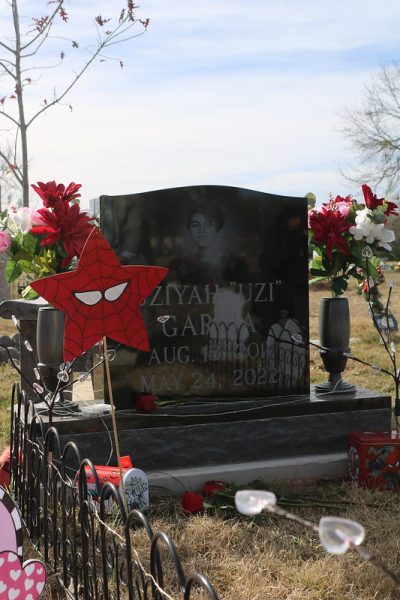
“There are little moments throughout the day where I’m like, ‘That was Uzi, that was you baby.’”
Uzi was a brave and caring kid, much like Spider-Man. He wanted to protect those around him and one day become a police officer so he could protect for a living. Uzi introduced Spider-Man to the people around him, including the people who continue to love him.
Uzi was cremated, but Nikki and Brett decided to lay a headstone to honor him and provide a place for people to visit and pay their respects. His headstone is accompanied by a stone bench with elaborate engravings of things he loved about life.
The wind shakes the windchimes in the trees near his headstone, surrounded by his classmates and teachers who also lost their lives on that horrifying day in 2022.
Resting on the bench, sitting next to Nikki and Brett, is a spider. Rather than being alarmed, Nikki finds comfort in the little arachnid that now reminds her of Uzi’s immense love and bravery. One hour, two hours, five hours later, and the spider still sits on the bench.
A little spider has the power to bring Uzi’s family back to the 10 years they were graced by his love and light. The spiders they come across may be an immediate reminder of the heart-wrenching pain they must face every day, but are also a connection to him and the legacy of strength he leaves behind.
Signs and messages from loved ones who have passed can be a brutal reminder that they are gone, but they also bring a sense of comfort knowing that their presence lingers on.
Moving Forward, Not Moving On
“Move on.”
“Get over it.”
The families and survivors heard these words over and over. They know that “moving on” is not an option; but rather, they will “move forward.”
Life continues.
Ogburn returned to the classroom to show her students that they can also go back to school, even if it seems impossible. Her priority has slightly shifted away from teaching and more towards safety. Teaching will always matter, she says, but she’s more aware of sounds. She looks out the windows and double checks the doors.
The Uvalde Independent School District closed the Robb Elementary campus after the shooting, leaving many teachers, students and community members feeling like a piece of their town’s history was stripped away.
Ogburn wasn’t comfortable going back on campus, so the relocation to Uvalde Elementary was welcomed, but she hoped they would keep Robb as the school’s name because it played such a large role in the community. Ogburn referred to the close knit community as the “Robb Mob,” but the state blocked their chances of keeping the name.
“It’s never going to completely go away, but we have to learn to live our lives in this new normal that we have, but it’s always in the back of my mind,” she says. “Not a day goes by that I don’t think about it.”
Ogburn finds purpose in keeping the memory of her two best friends alive. She does so by considering what they’d say while making lesson plans for her classes and participating in activities they loved.
Before the shooting, Eva was planning a 5k run for teachers to help them exercise more. Ogburn hopes to train and run a 5k alongside her coworkers, in honor of her best friend.
Jewelry and tattoos are also reminders for Ogburn. She wears a maroon bracelet she bought for her class after the shooting, which she held a fundraiser for in order to treat her students. She also wears a charm bracelet with angel wings and slogans like, “She believed, so she did,” and “Shine bright like a diamond,” which was Eva’s theme song.
Lastly, Ogburn wears a butterfly bracelet in memory of her student, Makenna Lee Elrod. Makenna used to go up to Ogburn every day and ask her for a hug. This special moment sparked Ogburn to get a butterfly bracelet not just for herself, but also for Makenna’s entire family.
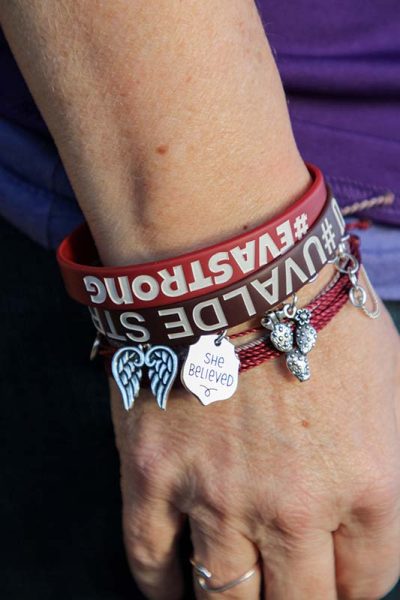
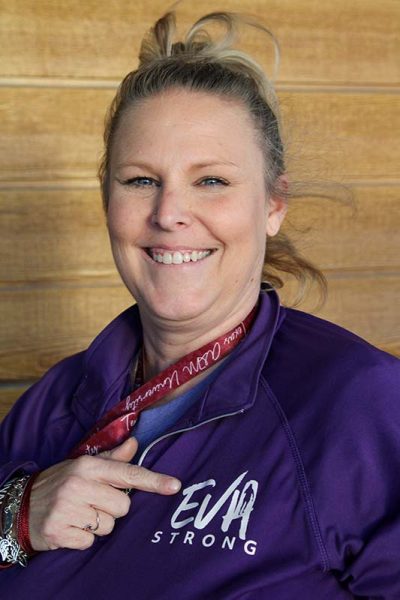
Brett and Nikki find their own unique ways to keep Uzi’s memory alive amidst the pain.
“I want my son to be remembered,” Brett says.
He will never give up fighting for Uzi’s legacy and the change that he and the 20 other souls deserved on that dark day.
“A quote I love is, ‘You’re not truly gone until the last person who remembers you dies.’ He wasn’t just a number. He wasn’t just kid number 19 in the Uvalde shooting. He was Uzi. And that’s what above everything else I want to get out there because he didn’t deserve that. No child deserves that.”
Cross wants to see gun laws changed and restrictions placed on assault rifles so no other parent has to feel the same pain he feels. Cross participated in two sit-outs in the city to raise attention to the police officers and others who need to be held accountable.
“I’m not fighting solely for Uziyah. He’s gone, nothing I do can bring him back,” he says to other parents who question why he participates in protests. “I’m fighting so that you don’t have to end up in this place.”
Cross also honors his son through art. He produces music that reflects his experience as a grieving parent and a parent who lost a child to gun violence. His latest song Imagine is a call for people to care about children’s safety. Through his lyrics, Brett asks his listeners to put themselves in his shoes for the song’s four minutes.
Alongside his music, Cross expresses his feelings through tattoos he’s gotten over the years. Each tattoo reflects a message that is meaningful to his relationship with Uzi, as well as his commitment to ending gun violence.
Both Brett and Nikki continue to include Uzi in any way they can. They get him gifts and decorate his headstone for every holiday.
“As his mom, it’s the only thing I can really give him anymore. I don’t buy him shoes or clothes or games or toys so these are the things for him now: flowers and decorations.”
His friends and family left him Valentine’s cards last year, Uzi’s favorite holiday. So this year, Nikki made a box for people to place their cards.
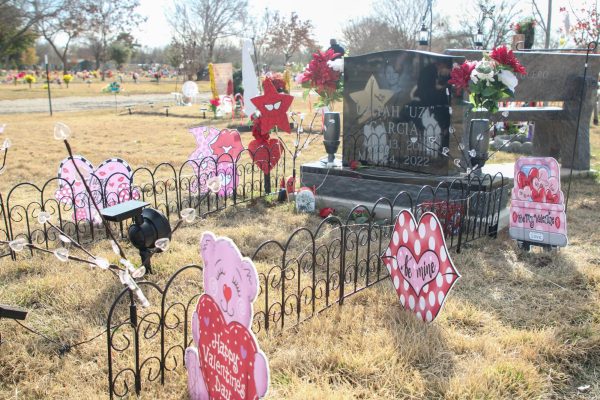
“He was such a fantastic kid. I just want the whole world to know everything about him,” Nikki says.
The Crosses don’t want the rest of the world to remember Uzi as one of the 21 lives that was lost in the Uvalde shooting, but they want their son to be remembered by his kindness and big heart.
Pastor Daniel Myers of Tabernacle of Worship joined Brett and other community members in speaking, demanding change. But he had to take a step back because of the fatigue that came along with the constant rejection and negativity. Pastor Myers continues to show up for the families and helps keep the 21 lives remembered.
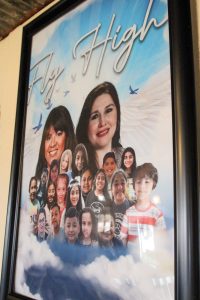
“I didn’t push church or religion on them,” Pastor Myers says. It was important to him, as the community attempted to heal, that the families knew he was in their corner. “I don’t know your pain, but I stand with you in your pain,” he told them.
For Reyes, moving forward looked different. While he still works hard in physical therapy two years later, Reyes couldn’t go back to teaching and had to turn to alternative outlets.
“I was the only one that survived in my classroom,” Reyes says. “I’m not too sure yet if I will return because of the environment, and I haven’t been in a classroom setting where I’m in charge of so many students, so I’m not sure yet if I can still handle that.”
Reyes tapped into his love for plants and put all of his energy into running his nursery, a shop he opened before the shooting. His nursery is a bright space filled with luscious plants and handmade pots. He collects and sells pots that are made in Mexico and also puts his own projects on display.
Running the shop allowed him to work on a schedule that supported him and his family. Creativity became a source of peace for Reyes, whether it’s painting or working in the nursery. It became therapeutic.
Reyes saw a decrease in local support after the shooting and his customers shifted more to tourists who wanted to meet him. Reyes continues to run his nursery, paint and sell handmade projects to support himself through this new journey of recovery and grief.
Moving on will never be an option for the people of Uvalde. But each day, they take a step forward and learn how to live again.
Ogburn has her bracelet and butterflies. But it doesn’t take away from the pain of her new reality.
“I don’t think people realize we are still going through the motions ourselves,” Ogburn says. “This doesn’t just go away. This is something that me and these kids will have to live with for the rest of our lives. It will take time to heal but we’ll never completely heal from it.”
